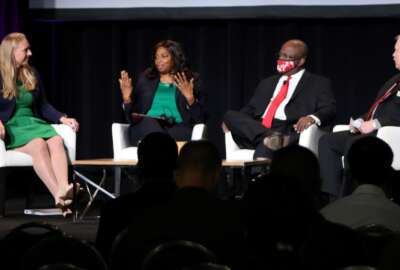A former Commerce official on the internet policy work yet to be done
The Commerce Department has been dealing with the internet and its implications since at least the mid-1990s, mainly through the National Telecommunications and...
Best listening experience is on Chrome, Firefox or Safari. Subscribe to Federal Drive’s daily audio interviews on Apple Podcasts or PodcastOne.
The Commerce Department has been dealing with the internet and its implications since at least the mid-1990s, mainly through an obscure agency known as the National Telecommunications and Information Administration. Evelyn Remaley worked there for many years, most recently as acting administrator. She’s now a partner at the law firm Wilkinson Barker Knauer and she joined the Federal Drive with Tom Temin to talk more.
Interview transcript:
Tom Temin: Ms. Remaley, good to have you on.
Evelyn Remaley: Tom, thank you so much, it’s great to be here with you.
Tom Temin: And I’ve been covering and following NTIA for many years myself, but just give us a quick reminder on what exactly the agency does.
Evelyn Remaley: Absolutely, happy to and I love that you call it obscure. It is a small agency within the Commerce Department. NTIA actually used to be a part of the White House and in the ’70s was moved over to Commerce. And really its main responsibility is to be the president’s adviser on information and communications technology issues. In addition to that, NTIA is the manager of the federal use of spectrum, so [it] works with all of the federal agencies on that. We play a big role in broadband deployment across the nation. We have folks who have focused on public safety communications, but really that role in terms of advising the president, the secretary of Commerce, that is our main focus.
Tom Temin: And does it also conduct the auctions of the spectrum?
Evelyn Remaley: So no, actually NTIA is not responsible for spectrum auctions. NTI is an executive branch agency, again, we manage the federal use of spectrum, but we work very closely with one of our partner agencies, the Federal Communications Commission, which is actually responsible for commercial use of spectrum. And it is the FCC that leads on the auctions.
Tom Temin: When you left, what were the big issues for spectrum for federal use of spectrum, I mean, what was on the plate for NTIA? Because probably fair to say a lot of this is not overly politically driven.
Evelyn Remaley: You would be surprised – just kidding. But spectrum for the agency, I mean, obviously, this is an area, the use of our airwaves nationally, this is something that continues to be a very competitive space as we advance technologically, in the U.S. and globally. And so really, as we’re looking ahead to our economic future, where we’re going to have connected cars and smart cities, and smart Ag and healthcare that’s connected, the use of our spectrum is all part of that. And so in terms of what NTIA has been focused on, there has been a big push over the last several years to be able to free up enough spectrum, mid-band spectrum in particular for 5G and other advanced services. So they’re very focused on that. The secretary of Commerce, Gina Raimondo coming in, has made one of her priorities a national spectrum strategy. Obviously, some of the things that we’ll be looking at is better coordination amongst federal agencies, as well as the private sector in terms of how that spectrum is allocated and used. Really looking at science-based studies and research to make sure that decision-making related to how we’re using spectrum, it’s efficiencies and safety is based on real solid evidence. They’re looking at things like workforce, just how we do the entire spectrum process more efficiently, and modernizing, really the systems that allow us to manage the spectrum in the smartest way possible.
Tom Temin: Well, I hope the cities get smart but we also need smart mayors and city councils to go along with that. I guess not much the NTIA can do there is.
Evelyn Remaley: That’s true. We can’t help them about that.
Tom Temin: We’re speaking with Evelyn Remaley, ahe’s a partner at Wilkinson Barker Knauer and former executive at the National Telecommunications and Information Administration. And at the time that you left late last year, there was a comprehensive policy review related to online privacy, copyright protection, cybersecurity, pretty much everything. Is that still going on?
Evelyn Remaley: So NTIA, as I mentioned at the top, it’s focused on internet policy and advising the White House and the Secretary of Commerce on that is one of its essential core missions. And so the Internet Policy Task Force is something that the Department of Commerce uses internally to coordinate on internet policy issues that impact many of the agencies within Commerce, from NIST to the International Trade Administration. And so we use that function to coordinate. In terms of NTIA’s internet policy mission we continue to work very actively on privacy issues. NTIA earlier this year launched a new inquiry, looking at the intersections between privacy equity and civil rights. So they’re very active on that. On the cybersecurity front, they sunset recently, a multi-stakeholder process where they had brought industry and civil society and government administrators into the room to deliberate how to do software supply chain security better. They came up with recommended best practices, all of the stakeholders that worked on that issue, which went into a recent cybersecurity executive order that the Biden administration published in terms of how we can do software security better across the nation. So they continue to be very active on all of these issues. Now with the new NTIA administrator joining, Alan Davidson, I think you’ll see that internet policy issue area ignited. Again, I know he has many ideas for where to take NTIA, I think you’ll see them moving into other new areas around artificial intelligence, machine-based learning to continue looking at how you bring the ecosystem together to solve these technology issues, working with the community to do it in a way that we can keep pace with the technology while making sure that the Internet stays open, secure and open for business for these new technologies.
Tom Temin: So fair to say that the NTIA staff and its different operating units do stay close with industry as much as with government?
Evelyn Remaley: Absolutely. Industry and civil society as well are really the key stakeholders that NTIA works with in terms of its policy development and analysis process, always looking for that way to balance a very vibrant digital economy with the types of best practices and approaches that we can put in place to make sure that we have an Internet ecosystem that we can trust, that is treating citizens’ data appropriately, that is secure from cyber threats. So the way that they do that is that they bring all stakeholders together to deliberate what joint practices can be adopted to keep that ecosystem safe and secure and trusted.
Tom Temin: And just a quick question on the digital divide. A question that goes back at least to the Clinton administration, when the first web browser got published to – coincidentally it was not Al Gore, it was Netscape Foundation. But nevertheless, that’s when it came out. And would it be accurate to say that the digital divide still exists, but it’s not as if those that are on the wrong side of it have zero, like they had in 1995, but maybe they just have not kept up with the best of broadband available to urban and high population areas?
Evelyn Remaley: On this issue of the digital divide, I would say that what we learned during the last two and a half years during the pandemic is that what we have in this country is not just a digital divide, we really had a digital chasm. And of course, we at NTIA knew that this was still an issue across the nation. We’ve been committed and working on this for decades to get more Americans connected. But I think it wasn’t until the pandemic that it became much more apparent to many others that we had citizens who couldn’t get to work, they could not interact with the doctor. Children could not get their homework done. They couldn’t get to school, because they did not have connectivity during the pandemic. You know, many of us are on our phones constantly all day working, managing our lives. Of course, during that time, that was our lifeline. And so we know now how many were left behind so NTIA very much the Biden administration as well, a very committed Congress as well, especially through the recent broadband and the Infrastructure Investment and Jobs Act, to make sure that we are investing to ensure that every American has access to high speed internet.
Tom Temin: Evelyn Remaley is a partner at the Wilkinson Barker Knauer law firm and former executive at the National Telecommunications and Information Administration, part of the Commerce Department. Thanks so much for joining me.
Evelyn Remaley: Tom, it’s such a pleasure being here. Thank you so much for inviting me today.
Copyright © 2024 Federal News Network. All rights reserved. This website is not intended for users located within the European Economic Area.
Tom Temin is host of the Federal Drive and has been providing insight on federal technology and management issues for more than 30 years.
Follow @tteminWFED






